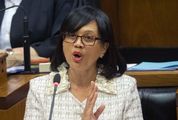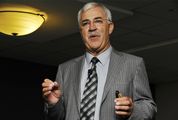EDUCATION: Addressing the teacher capacity problem
by Johann Barnard,
2014-11-20 07:01:31.0
STRENGTHENING the country’s basic education system is a multifaceted, long-term process that requires many interlocking parts to work together if it is to be successful.
One problem that cannot be overcome overnight is teacher capacity, not only in the number of teachers but more in the skills they possess.
In terms of the numbers, the medium-term strategic framework says universities are expected to produce 20,000 teacher graduates a year by 2019 — up from the almost 14,000 graduates in 2013.
The National Development Plan (NDP) acknowledges that while the number of qualified teachers grew from 54% in 1990 to 94%, outcomes have remained poor. The national education department, meanwhile, is taking action, profiling all teachers to assess their skills levels.
“In order to effectively deliver the curriculum it is crucial that we have the correct teacher teaching the correct subject in front of the class,” says Troy Martens, the education minister’s spokesman in response to questions on teacher capacity programmes. “The absence of teacher profiling in the past has compromised the ability of provincial education departments to deploy educators correctly.” This skills audit is expected to be completed by March 2015.
The department has also committed almost R900m in the 2013/14 year for 14,500 bursaries awarded to prospective teachers through its Funza Lushaka Bursary scheme. This has more than doubled from the R424m awarded in 2010/11.
It has also developed a plan to guide the placement of Funza Lushaka graduates within their final year of study “to ensure that we best utilise these essential skills”. Martens says this programme has been successful thus far and it is already assisting with addressing teacher shortages in the Eastern Cape and KwaZulu-Natal.
The National Education Collaboration Trust is seen as one of the key mechanisms to achieve the goal of interlocking interventions. The trust is made up of business, civil society, government and labour to achieve NDP goals.
The education department says one of its aims is to support and influence the agenda for reform of basic education, including teacher development. An example of the type of outcomes from such cross-cutting collaboration is the use of mathematics, science and technology hybrid workbooks developed by the Sasol Inzalo Foundation. These materials are to be used to train advisors.


Picture: THINKSTOCK
STRENGTHENING the country’s basic education system is a multifaceted, long-term process that requires many interlocking parts to work together if it is to be successful.
One problem that cannot be overcome overnight is teacher capacity, not only in the number of teachers but more in the skills they possess.
In terms of the numbers, the medium-term strategic framework says universities are expected to produce 20,000 teacher graduates a year by 2019 — up from the almost 14,000 graduates in 2013.
The National Development Plan (NDP) acknowledges that while the number of qualified teachers grew from 54% in 1990 to 94%, outcomes have remained poor. The national education department, meanwhile, is taking action, profiling all teachers to assess their skills levels.
“In order to effectively deliver the curriculum it is crucial that we have the correct teacher teaching the correct subject in front of the class,” says Troy Martens, the education minister’s spokesman in response to questions on teacher capacity programmes. “The absence of teacher profiling in the past has compromised the ability of provincial education departments to deploy educators correctly.” This skills audit is expected to be completed by March 2015.
The department has also committed almost R900m in the 2013/14 year for 14,500 bursaries awarded to prospective teachers through its Funza Lushaka Bursary scheme. This has more than doubled from the R424m awarded in 2010/11.
It has also developed a plan to guide the placement of Funza Lushaka graduates within their final year of study “to ensure that we best utilise these essential skills”. Martens says this programme has been successful thus far and it is already assisting with addressing teacher shortages in the Eastern Cape and KwaZulu-Natal.
The National Education Collaboration Trust is seen as one of the key mechanisms to achieve the goal of interlocking interventions. The trust is made up of business, civil society, government and labour to achieve NDP goals.
The education department says one of its aims is to support and influence the agenda for reform of basic education, including teacher development. An example of the type of outcomes from such cross-cutting collaboration is the use of mathematics, science and technology hybrid workbooks developed by the Sasol Inzalo Foundation. These materials are to be used to train advisors.






















Change: -0.47%
Change: -0.61%
Change: 0.53%
Change: -0.42%
Change: -2.12%
Data supplied by Profile Data
Change: -0.46%
Change: -0.15%
Change: -0.47%
Change: 0.00%
Change: -0.20%
Data supplied by Profile Data
Change: -1.03%
Change: -1.18%
Change: -0.73%
Change: -1.36%
Change: -1.13%
Data supplied by Profile Data
Change: 0.63%
Change: 1.46%
Change: 1.45%
Change: 0.00%
Change: 0.89%
Data supplied by Profile Data